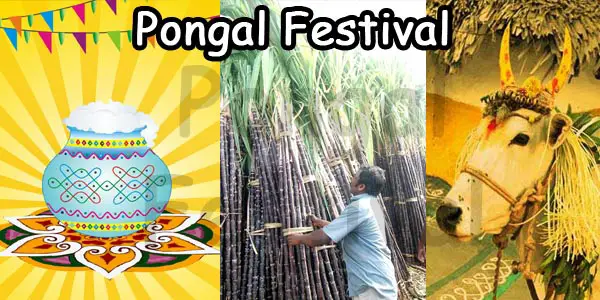Same festival having different names is ‘Pongal’ in Tamil Nadu, Durga Puja in West Bengal, ‘Baisakhi’ in Punjab, ‘Bihu’ in Assam, ‘Makar Sankranti’ in Andhra Pradesh, ‘Onam’ in Kerala and ‘Makar Sankranti’ in Karnataka and other states.
Tamil ‘Pongal’ is the omen of hope of new era of prosperity. Festival signifies end of harvest season. People have plenty of hopes associated with Tamil ‘Thai’ month that begins with ‘Pongal’ Day.
Saying in Tamil goes ‘Thai Piranthal Vali Pirakkum’. It means when ‘Thai’ dawns, everyone’s life is full of love, peace, harmony, prosperity and joy. Month of ‘Thai’ begins on 14th or 15th January is considered very auspicious. Young people eagerly wait for ‘Thai’, because this month is for weddings. Also, others hopefully wait for arrival of ‘Thai’ month when they celebrate other happy occasions.
‘Pongal’ is the embodiment of Tamil culture. During ‘Pongal’, best in nature and skills of people are exposed. People celebrate ‘Pongal’ to show their gratitude to Mother Nature who blessed with normal rainfall. Hundreds of temples all over Tamil Nadu arrange for ‘Sama Bandhi Virundu’ [community feasts]. People from all castes and religions participate in this ‘Pongal’ feast.
The courage of Tamils is best depicted in events namely ‘Jallikattu’ or ‘Manjuvirattu’. These are bull-fighting in which youth has to control the fearsome bulls. These brave men are honoured and given prizes. Nature of showing respect to elderly, near and dear ones is revealed on ‘Kaanum Pongal’. The skills of women are apparent during the ‘Pongal’ festival. Women make ‘Kolams’ in front courtyard of houses and delicacies like ‘Sarkarai Pongal’.
The ‘Pongal’ celebrations continue for four days. Day before ‘Pongal’ is known as ‘Bhogi’ when it is celebrated as a family festival. On ‘Bhogi’, bonfire is made early morning, in front of their houses amidst the beating of drums. People throw their discarded old things into this bonfire. On ‘Pongal’, women draw Rangolis with caption ‘Pongal o Pongal’ [Hail Pongal], in front of their homes. The right dedication of celebrations can be seen only in the villages. Newly harvested rice, with little milk, is boiled in new mud pots during auspicious time. Sugarcane is kept by the side of the pots.
Soon as boiling is over, cooked rice known as ‘Pongal’, is offered to Sun God. Camphor is lit, coconut is broken and God is invoked to bless the family with good luck. Thus, the cycle continues every year hoping for prosperity. Everyone wears new clothes on ‘Pongal’ day and exchanges greetings with friends and relatives. Joy knows no bounds. Landlords are liberal in giving away substantial amounts of produces to labourers who work for them.
On third day, ‘Maatu Pongal’, cattle are colourfully decorated with flowers and saffron adorning their foreheads. Their horns painted and they are fed sumptuously. Farmers pray for good health of cattle so that they multiply and bring prosperity. On fourth day, sisters visit their brothers and ask about their welfare. In a way, this day resembles ‘Raksha Bandhan’ and it is called as ‘Kaanum Pongal’. Also, people visit their friends on this day.
Tamil ‘Pongal’ brings family reunions and get- together. Past enmities and rivalries are forgotten and forgiven so there is unity and good understanding. Individual able to remove darkness of ignorance or arrogance from within can gain greatness. ‘Pongal’ blesses one’s inner beings with glorious peace, love and compassion. Everyone’s heart and mind burns with different lights. This light is of knowledge, warmth of human love and compassion.